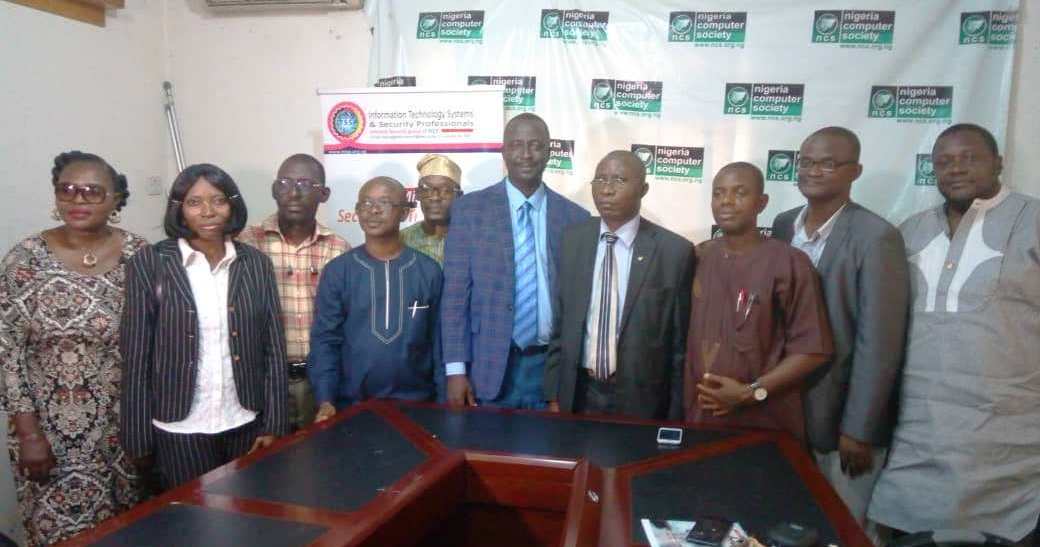Telecom
ITSSP Amplifies its Voice on Critical Cyber Security Issues Mitigating smooth ICT Development

The Information Technology Systems and Security Professionals (ITSSP) is set to address critical cyber security issues mitigating smooth development of information security in Nigeria.
Professor Adesina Sodiya, President, Information Technology Systems and Security Professionals (ITSSP) disclosed this on tuesday during a press conference meant to address critical cyber security issues mitigating smooth development of information security in Nigeria.
Sodiya, bemoans business owners for their unwilling to invest in basic security management and control systems, and assumes that the IT department will take care of any security issues that may arise.
He emphasized that it is important for the organisations to understand the nature of threats against their businesses and the impact of a breach on production, finances, intellectual property and reputation.
He said, “Organizations must continuously monitor their networks and have the ability to detect and mitigate intrusions as quickly as possible.
“Every organisation must develop information security policies, procedures and plans; and these need to be updated regularly and enforced to help keep pace with the constantly evolving threat landscape. Human beings are often the weakest link”.
According to Prof. Sodiya, an extremely high proportion of attacks involve social engineering approach.
“Many Nigerians, and even people all over the world, are still increasingly fallen victims of socially engineered attacks.
“In 2016, there are records that financial institutions in Nigeria faced Distributed Denial of Service Attacks (DDoS).
“This confirms that online activities are not completely secured.
“Security awareness and training are therefore indispensable.
“Attackers may be using customized attacks, but operating methods typically remain the same.
“Looking ahead at the future, security will probably be established by balancing controls and risks to produce scalable and flexible strategies.
“More persistent internal monitoring and sharing of security intelligence are necessary for a more effective security approach.
“For a security strategy to be workable for the present and the long terms, it is important to look ahead.
“Organizations tend to focus on reacting to security threats rather than being proactive.
“Functioning in this way provides no future growth in the adoption of the security framework.
“It is essential that organizations remain flexible and adaptable to achieve the long term security benefits.
“The organizations current security state, relative to the risk they are willing to take and effective security alignment will determine the achievable desired security posture for the future”.
Vice President of ITSSP, Liberty Echewodoh, highlighted the need to understand that information security in not only about firewalls, antivirus software and passwords.
“Information security is a continuous process that requires modern approaches and persistent management.
Collaborative strategy and efficient practices are required in protecting valuable assets of organisation to achieve major security goals of confidentiality, integrity and availability (CIA)”, he said.
Meanwhile, Professor Sodiya, added that in the light of the above, it will then require inter-professional expertise and collaboration from IT Security Experts, Investigation officers, Prosecuting officers, Lawyers, Judges and Courts with enough experience to adjudicate in any judicial resolution that involves e-driven activities.
“It is therefore an enormous task to focus on capacity building and sustainability in an environment that is embracing multi-facet e-services like ours without equal amount of energy geared towards developing necessary structures.
He listed the challenges as:
In financial sector, the enormity of fraudulent activities going on daily as being reported periodically by the Fraud Forum Unit of CBN is alarming.
The Central Bank of Nigeria, the Courts, and Federal Bureau of Statistics cannot provide sufficient data that can mitigate such activities adequately.
Some banks also experienced distributed denial of service (DDoS) attack in the last two years.
More and more individuals and organisations continue to experience different levels and types of cyber-attacks in Nigeria.
It has been forecasted that the next world war will be fought in the cyberspace. How prepared are we?
There is now cold cyber war all over the world.
“Do we have well experience information security experts in various organization?
|What is the level of cyber readiness in various organization?
“Where is IT Security Policy for National, State, Agencies, Higher Institutions of learning, as well as coordinating strategies; Media houses both Print and Electronics are not left out because they currently depend on e-platforms to function effective nowadays”.
In view of the above, ITSSP calls for full Implementation of the Cybercrime Act 2018; “Professional bodies should be included in the Council”, the President said.
“ITSSP calls for efficient and coordinated Computer Emergency Response (CERT).
“The Cyber Security Act that domicile in National Security Adviser’s office should create a civil arm of Cyber Security in executing its mandate like (Computer Emergency Response Team ‘CERT Nigeria’) with the professional agencies such as NITDA, CPN, Nigeria Computer Society (NCS), NBA where civilian population can easily relate, because the NSA is currently being viewed as arm forces affairs only.
“Strong Collaboration with relevant government agencies. In order to effectively curb the menace of cyber criminals in Nigeria, we seek strong collaboration with relevant stakeholders like CBN, NIRA, NCC, NPF, ICPC, EFCC, NITDA, NBA and banking institutions in Nigeria.
“Relevant government security agencies like Nigeria Police Force (NPF), Independent Corrupt Practices and Other Related Offences Commission (ICPC), Economic and Financial Crimes Commission (EFCC), and National Identity Management Commission (NIMC).
“There is need for adequate and accurate cybercrime data and statistics in the country.
“The system for realising this should be developed and maintained by ITSSP. ITSSP will develop an intelligent incident handling system.
“Support for capacity building in all areas of Information Security.
“NITDA and other stakeholders should support the development of high level skill in Information Technology.
“Of greatest importance is capacity building in this area, the Cyber Crime Art of 2015 in trying to address this established a fund for such development to be managed by its board.
“As it is now, this fund account is yet to be opened not to talk of collecting fund into it despite the fact that the Board had been in existence for over a year; just like NITDA also set up Information Security Department saddle with responsibility of Cyber Security.
“Civil arm of Cyber security coordination to complement what was done by NSA.
Mr. Rogba Adeoye, ITSSP National Secretary, In his contribution, said that all stakeholders must join and cooperate in fighting the cyber security warfare.
“We need to be proactive and not only reactive. We need to rapidly promote and develop information security in Nigeria”, he said.
Information Technology Systems and Security Professionals (ITSSP) is an information security group of the Nigeria Computer Society, with the major goal of promoting and developing Information Security in Nigeria.
Telecom
MTN Plans Second Public Offer in Nigeria

Ralph Mupita, president,MTN Group, has announced plans to reduce its shareholding in MTN Nigeria through a public offer after it returns to profitability.

The group aims to cut its stake from 76 percent to 65 percent in line with its longstanding commitment to deepen local ownership, according to ITWeb, South African tech publication.
Mupita, who disclosed the plan during an editors’ roundtable meeting this week, said “The only localisation we have as MTN Group is we have potentially a sell-down in Nigeria at some point in time, approximately 11 percent. This is something we have said long ago, that over time, we would want more Nigerians owning the company, and we are prepared to sell down to 65 percent. We are at around 76 percent,” he said.
The anticipated offer would mark MTN’s second major retail public offering in Nigeria, following its 2021 sale of 575 million MTN Nigeria shares to local investors.
That offer was oversubscribed, resulting in the allocation of 661.25 million shares, including a 15 percent greenshoe option. This reduced MTN’s stake in its Nigerian unit to 75.6 percent from 78.8 percent.
More than 126,000 investors participated in that round, including retail and institutional investors such as Nigerian pension funds, representing approximately 6.5 million contributors.
At the time in 2022, MTN Group announced plans to further reduce its stake to approximately 65 percent from 75.6 percent.
Mupita confirmed that the Group would only proceed with a new offer once MTN Nigeria resolves its negative equity position and resumes dividend payments.
Currently, MTN Nigeria’s shares are trading at N235 per share.
Despite reporting a revenue of N3.36 trillion in 2024, a 36.03 percent bump from N2.47 trillion in 2023, it posted a loss after tax of N400.44 billion, a 192.25 percent rise from N137.02 billion in 2023.,
This negative performance was driven by macroeconomic headwinds, including record inflation and a steep devaluation of the naira, which raised operating costs and wiped out investor value.
MTN Nigeria has fallen behind MTN South Africa as MTN Group’s largest revenue contributor.
However, the Group is projecting a rebound in 2025, citing key drivers such as recent tariff adjustments, operational restructuring, and improving macroeconomic indicators in Nigeria.
Speaking at the roundtable, Mupita highlighted that the Group is anticipating a V-shaped recovery in Nigeria’s service revenue. He pointed to the recent structural reforms, such as the removal of fuel subsidies, the naira stabilisation, and improved dollar availability.
“The continued normalisation of these factors, particularly naira stability, should have positive impacts on consumer spending power and our business operations,” Mupita noted in the Group’s financial statement for 2024 recently.
Telecom
MTN Staff Commission New Set of Classrooms at Iwerekun Community High School

In a remarkable demonstration of corporate volunteerism, MTN staff, through the Y’ello Care initiative, have renovated a school block at Iwerekun Community Senior High School, Lakowe. This effort has restored hope and significantly improved learning conditions for both students and teachers.

The project, led by dedicated MTN employees, is part of the annual Y’ello Care campaign, which focuses on empowering communities through education, digital inclusion, and economic support.
Prior to the renovation, students at Iwerekun Community Senior High School faced challenges, including deteriorating classrooms that hindered effective learning. Recognising the need for intervention, MTN staff stepped in to transform the learning space, creating a safe, conducive, and inspiring environment for both students and teachers.
At the commissioning ceremony, Honourable Jamiu Tolani Alli-Balogun, Commissioner of the Lagos State Ministry of Basic and Secondary Education, acknowledged the significance of MTN’s contribution to education: “The education sector worldwide thrives on collaboration and commitment between public and private partners. MTN’s generous contribution is truly recognised, and I express my deepest gratitude for its unwavering commitment to supporting education in Lagos State. This new facility will provide a conducive environment for teaching and learning, enabling our students to reach their full potential.”
Representing the Ojomu of Lakowe, Prince Mukaila Adeola expressed the community’s gratitude: “This is a rare opportunity, and it is not every day that Lakowe benefits from such support. We truly appreciate MTN for this contribution, and we look forward to even more support in the future.”
The renovated school block is equipped with improved water supply and an inverter included in a serene environment that enhances the learning experience. This renovation will ensure that students and teachers have a more comfortable and sustainable academic setting.
Speaking on the significance of the project, Tobe Okigbo, Chief Corporate Services and Sustainability Officer (CCSSO) at MTN Nigeria, emphasised the personal investment of MTN staff: “I want to emphasise that this commissioning was made possible by the dedicated staff of MTN. Although MTN has a Foundation funded by 1% of the company’s annual profits, the credit for this commissioning goes to the MTN Nigeria staff members who, through their personal contributions, made this happen.”
Beyond the fresh coat of paint and structural improvements, initiatives like this create a lasting impact and a sense of hope in the lives of the students. The addition of a reliable power source and water facility means that students no longer have to struggle with poor infrastructure, allowing them to focus on their education.
For many students, access to quality education remains a challenge—not just because of financial barriers but also due to poor infrastructure, lack of resources, and limited teacher support. Programmes like Y’ello Care, alongside other education-focused volunteer initiatives, are helping to fill these gaps by creating safe, well-equipped learning environments and equipping students with knowledge beyond the classroom.
With the successful completion of the Lakowe school project, MTN reaffirms its commitment to education and youth development. The company encourages more organisations to embrace volunteerism and community service, as collective action remains a powerful force for societal progress.
Telecom
Scandium Introduces TestPod to Revolutionize Software Testing Across Africa and Beyond

Today’s software ecosystem is moving fast, building quality digital products has never been more crucial and more complex. As teams accelerate release cycles using a blend of manual and automated testing, one persistent issue remains: test management is fragmented.

That’s the problem TestPod, a newly launched test management platform from the team behind Scandium, is built to solve.
TestPod officially launched on Friday, April 11, 2025, offering software teams (whether in Africa or anywhere else) a much-needed solution to centralize and track their testing processes across platforms and test types. Whether it’s manual, automated, exploratory, accessibility, performance, or regression testing, TestPod brings visibility, structure, and speed to fragmented QA workflows.
“We spoke to over 200 teams at different African startups and enterprises, and despite having some automation in place, at least 90% are still heavily reliant on manual testing, just like their global counterparts,” said AbdulAzeez Ogunjobi, CEO and Co-Founder of Scandium Systems.
He explains that while Scandium’s AI-powered no-code automation suite is already being used across web, mobile, and API products globally, TestPod addresses a more foundational gap: organizing and managing all forms of testing—not just automation.
“Furthering our mission to help teams build bug-free digital products, we’re launching TestPod to help them organize their software testing operations, regardless of what kind of testing they need to do,” he added.
The timing is critical. According to the World Quality Report 2024–25, 68% of organizations are exploring Generative AI in their QA workflows, but most still lack clarity on what tests are running, what’s failing, and how test coverage aligns with ongoing releases.
Meanwhile, Africa’s digital economy is booming. A recent McKinsey report estimates it could contribute over $712 billion to continental GDP by 2025. The continent now holds more than 1.1 billion registered mobile money accounts, and in 2023 alone, over $1 trillion in transactions were processed across Instant Payment Systems, according to AfricaNenda. Regulations are tightening. Quality, reliability, and user trust are becoming more central, as the continent churns out more tech solutions in expanding sectors.
Testing isn’t just about automation. It’s about knowing what’s working and what’s broken.” noted Sodeeq Elusoji, CTO and Co-Founder of Scandium. “The real bottleneck in testing isn’t always a lack of automation—it’s lack of visibility. You can’t improve what you can’t track, and that’s what TestPod delivers.”
Unlike traditional tools that prioritize rigid workflows, TestPod is lightweight, modern, and flexible, designed for agile teams who need to move fast. It supports test case authoring, tagging, execution tracking, and real-time dashboards.
“Testing has evolved, but the way teams manage tests hasn’t caught up. We’ve seen teams with advanced automation pipelines still tracking test outcomes in spreadsheets and Slack.” said Jafar Alabi, Vice President of Products and Business Development at Scandium.
While it integrates seamlessly with Scandium’s no-code test automation suite, TestPod is framework-agnostic, making it a perfect fit for teams using Selenium, Playwright, Cypress or other custom test stacks.
Backed by a proven team with success building Africa’s first no-code test automation platform, Scandium has already achieved 6-figure ARR and powers test automation across 120+ organizations in 15+ countries. With TestPod, they’re expanding that impact even further—from test execution to test orchestration.
TestPod is now available at testpod.io. Early access is open globally and free for teams of all sizes.
As Africa’s tech scene continues to accelerate—with fintech, health tech, and mobility leading the charge, TestPod is built to ensure these innovations are not just fast but flawless.

 E-Business2 days ago
E-Business2 days agoCyberattacks: ‘56 Percent of Cases Stem from Existing Logins

 General News3 days ago
General News3 days agoAFD Commits €3m to Africa’s Financial Inclusion

 News2 days ago
News2 days agoSenate Committee Partners with Kuda Bank to Tackle Compliance Crisis as Nigeria Loses ₦3.4 Trillion

 E-Financial3 days ago
E-Financial3 days agoVerve Expands Payment Frontiers with Global Partnerships, Contactless Innovation

 Broadcasting2 days ago
Broadcasting2 days agoSubscriber Withdraws Suit against MultiChoice, FCCPC over Price Hike

 E-Business2 days ago
E-Business2 days agoKaspersky Presents Insight on 14% Increase in Spyware Attacks on Businesses in Africa @ GITEX Africa

 General News3 days ago
General News3 days agoEU Aims to Remove Barriers to AI Development

 News3 days ago
News3 days agoFG Inaugurates Board of Galaxy Backbone


























